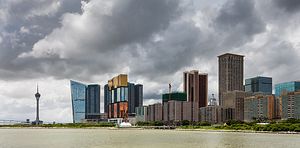On October 28, voters in Taiwan’s Kinmen County will vote on a referendum to approve the construction of an integrated resort with casino gaming. A 2009 revision to the Offshore Islands Development Act legalized integrated resorts in Taiwan’s offshore islands of Kinmen, Matsu, and Penghu, subject to approval in a referendum by local voters. Previous referenda in Penghu failed two times, while one in remote Matsu was approved. What makes the Kinmen referendum different is a changed economic and strategic landscape for Taiwan as well as strong local support.
Supporters estimate that an integrated resort on Kinmen will increase Taiwan’s GDP by 1.39 percent per annum, add NTD 25-30 billion (US$0.8 to $1 billion) in tax revenue annually, create over 15,000 new jobs, and attract up to NTD100 billion ($3.3 billion) in foreign investment. An integrated resort in Kinmen would also be able to tap the the over 50 million annual visitors to Xiamen, who could arrive at gaming tables within 25 minutes via the expedited entry procedures of the direct links program between Kinmen and Xiamen.
Indications are that the upcoming referendum has overwhelming local support. In a first for a proposed referendum in Taiwan, supporters collected valid identification card photocopies of the over 6,000 signatories to the petition, in order to refute casino opponents’ accusations of falsified signatures. For Democratic Progressive Party politicians who have sought to make referenda on issues of local and national importance more accessible to the citizenry, this exercise of democracy on the local level should be supported, if not celebrated.
Most importantly, an integrated resort in Kinmen presents Taiwan with the opportunity to execute an economic project that is likely to attract foreign investment, can improve its relationship with the United States, and provide Taiwan leverage in its relationship with China. The high investment hurdle (expected to be $2 billion) and experience requirements that are likely to be included in the future request for proposals will necessitate the participation of multinational operators. The large investment made by U.S. companies in Macau and Singapore’s gaming industries ensures an accompanying U.S. political investment in these locations’ rule of law and security; similar U.S. investments in Kinmen casinos could reap similar benefits.
Meanwhile, despite the fall in Chinese visitors to Taiwan by more than 600,000 in 2016 amid deterioration in the political relationship, such considerations would be of secondary concern to individual Chinese gamblers visiting a Kinmen integrated resort. Their spending can only provide Taiwan economic leverage over China, while for political leverage, visitors from China should be viewed by Taiwan as an important aspect of demonstrating Taiwan’s democracy and separate identity to people across the Taiwan Strait. Current efforts by Taiwan’s government to increase inbound tourism from other parts of Asia are worthwhile but will not have the same positive impact on Taiwan’s relationship with China.
Opponents to integrated resorts in Taiwan have cited similar concerns as in other jurisdictions, such as the resort’s potential impact on the environment, problem gaming, and the influence of organized crime. The most outspoken opponents tend to be scholars and non-government organization leaders, whose views, however important to the discussion, do not offer alternatives that will concurrently stimulate Taiwan’s tourism sector and contribute to Taiwan’s economic security. To the extent organized crime continues to offer underground casinos, the absence of an integrated resort deprives the authorities of needed tax revenue while simultaneously providing a platform to engage in other criminal activities in the shadows such as narcotics and prostitution.
Regardless, these concerns fall away when measured against the ability to access accumulated experience and best practices of integrated resorts in other countries, Taiwan’s stringent environmental impact assessment procedures, years of domestic experience managing problem gaming that arises from the existing sports lotteries, and a highly (some would say overly) regulated financial sector. Arguments that Taiwan is unable to manage these risks only denigrates Taiwan’s admirable progress in recent decades to entrench the rule of law and transparency in matters of economic development. Opponents should also bear in mind that Macau receives over one million visitors from Taiwan annually, whose gaming dollars could instead be more safely spent within the jurisdiction of Taiwan rather than in a special administrative region under the authority of Beijing.
Taiwan’s political leaders under both Kuomintang and now Democratic Progressive Party administrations have taken a cautious approach to integrated resorts. During this time, other jurisdictions in Asia have recognized the value of such facilities, with Japan the most recent to join the list in anticipation of the 2020 Tokyo Olympics. Strategically, an integrated resort in Kinmen that will lure Chinese visitors and foreign investment would be an extraordinary opportunity from which all stakeholders could claim a victory.
Ross Darrell Feingold advises clients on political and economic developments in Asia.

































